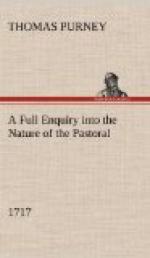CHAP. II.
Of the Fable; and the means of making a perfect One.
A Fable proper for Pastoral, and best adapted to delight, must have these following Qualities to render It compleat.
First, It must be one entire Action, having a Beginning, a Middle, and an End.
Secondly, A perfect Fable must have a due Length. And not consist of only a mournful Speech which a Shepherd find’s occasion to make; or the like.
Thirdly, And since all Poetry is an Imitation of the most Considerable, or the most Delightful Actions in the Person’s Life we undertake; not any trifling Action can be sufficient to constitute the Fable.
Fourthly, Another Quality which a Pastoral Fable should have to be the most compleat is a Moral Result.
I shall speak to all these Heads, except the first, concerning the Unity; for without that Quality, it’s self-evident that ’tis no Fable. By Unity I mean the same with Aristotle.[A]
[Footnote A: See his 6th Chapter.]
SECT. 1.
What Length a perfect Pastoral should have.
All Pastoral-Writers have used the same Length which Theocritus at first happen’d into. I shall be therefore obliged, I doubt, to dwell longer, on this Head, than the Importance of it may seem to require; and must premise, that tho’ a Fable would need, finely carry’d on, to be three or four Hundred Lines, yet let no Writer be under any Concern about this: If a Fable have Unity, shews a delightful story, paints proper Characters, and contains a Moral, I shall not doubt to call the Poem a perfect and compleat Pastoral, tho’ the Length exceeds not fifty Lines. But my Reasons for extending it are these:
Some Author I have seen, ingeniously observes, that even in telling common Stories, ’twere best to give some short Account of the Persons first, to be heard with Delight and Attention; For, says he, ’tis not so much this being said, but its being said on such a particular Occasion, or by such a particular Person. As this is true in a common Story, so ’tis more so in a Poem. The strongest Pleasure that the Mind receives from Poetry, flows from its being engaged and concerned in the Progress and Event of the Story. We naturally side in Parties, and interest our selves in their Affairs of one side or the other. Then ’tis, our Care pursues our Favourite Character, where’re he goes. We anticipate all his Successes, and make his Misfortunes our own. Were the Catastrophe in a Tragedy to appear in the first Act, but little should we be moved by it, not having as yet imbibed a favourable Opinion of the Hero, nor learn’d to be in Pain as often as he is in Danger.
Now, we may read, I fear, some Number of the Pastorals of the ordinary Length, before we shall meet with this Pleasure. The Truth is, we are commonly past a hundred Lines, the length of these Pieces, before the Mind and Attention is entirely fix’d, and has lost all its former and external Thoughts. All the Pleasure therefore which proceeds from the Story is lost in these short Pieces.




